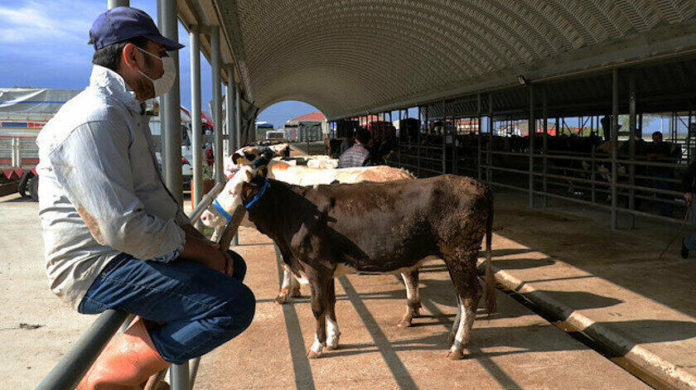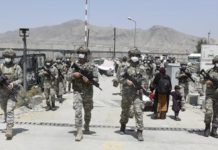Turkey began the Islamic holiday of Eid al-Adha, the Festival of Sacrifice, under the shadow of COVID-19, with authorities warning citizens to scale back some festivities as no restrictions or lockdowns will be imposed.
The Eid feast takes place between July 31 and Aug. 3 this year.
The Eid is traditionally celebrated with mosque prayers, large family gatherings and the sacrifice of animals, as well as visits to the elderly and cemeteries. But authorities and public health experts have urged people across the country to follow strict hygiene rules, including avoiding shaking and kissing hands and hugging each other.
Health experts warned people to avoid entering crowded animal markets, where sacrificial cows and sheep are slaughtered, as the closed and unsanitary venues could serve as petri dishes for a surge in coronavirus infections.
President Recep Tayyip Erdoğan had also urged members of the public to shy away from performing their sacrifices on the first day of the Eid, when the faithful usually sacrifice their animals to later distribute it to neighbors and the needy as part of the tradition.
This Eid will see lax restrictions in comparison to the Eid al-Fitr, which coincided with a prolonged weekend lockdown and wider stay-at-home orders at the end of May.
Large numbers of vehicles dotted the highway in Bolu, a Black Sea province between Istanbul and the capital Ankara, early July 30, on the eve of the Eid, but not to a point of a traffic congestion. Reports said the roads leading to Istanbul, the epicenter of the outbreak in the country, saw very little traffic, indicating that many travelers were leaving Turkey’s largest city by population to smaller resort towns. Eid holidays traditionally see people living in larger cities travel to their hometowns elsewhere in Turkey to visit their families.
Interior Minister Süleyman Soylu said on July 30 that 163,000 police officers and gendarmes would be deployed over the holiday, stressing traffic intensity was a lot higher now than before the pandemic.
“Today, there is an increase of 31 percent in traffic movement, while bus services have seen a 31 percent decrease. But the number of passengers has seen a 55 percent increase. This means that especially on Eid, people are using their vehicles to travel to their hometowns or holiday,” Soylu said, adding that this change in trend was all due to the COVID-19 pandemic.
Erdoğan also conveyed Happy Eid wishes to the nation and the Muslim world on July 30, saying the world was experiencing a somber feast as millions of Muslims were barred from going on the hajj pilgrimage to Mecca, one of Islam’s holiest cities.
“God willing, millions of Muslims will visit the Kaaba [holy site in Mecca] and the holy lands filling them with love, joy and happiness next year. As Turkey, we have handled the epidemic with success in health primarily and all other areas, getting international appreciation. With the normalization phase, life in all sectors, excluding tourism, have reached their pre-pandemic rhythm,” he said in his address.



























